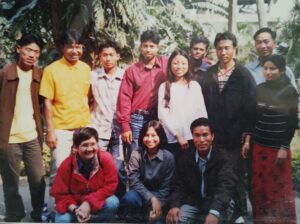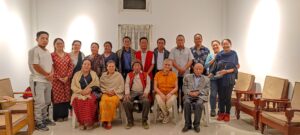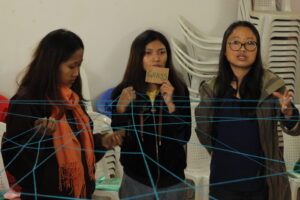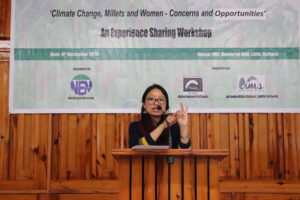Wekoweu Tsuha
Leading Grassroots Movements and Promoting Sustainable Livelihoods
Wekoweu Tsuha, affectionately known as Akole, serves as the State Coordinator of North East Network (NEN) in Nagaland. Over the years, she has been at the forefront of grassroots women’s movements, demonstrating an unwavering commitment to promoting sustainable development models. One of her focuses lies in strengthening local food systems and sustainable farming practices, and foregrounding women’s voice and knowledge through varied means such as community seed banks, farmers’ markets, and the regeneration of natural resources. Akole engages in multifaceted projects that create platforms for women farmers, weavers, and home-based workers. What truly sets Akole apart is her boundless commitment to self-improvement and innovation.
So, without further ado, let’s hear about this inspiring tale from Akole herself.
How did your journey with the women’s rights movement in Nagaland begin?

Wekoweu in an Exposure Visit to Tura in the year 2005
In mid-2004, I received an invitation from NEN to join their work in Chizami, my village in Nagaland. At that time, I had just completed my college exams and found myself back in my village without any specific plans. NEN was actively involved in addressing various issues related to women’s rights in Chizami, including reproductive and sexual health rights.
Joining NEN marked my introduction to the women’s rights movement and my journey began with fostering self-awareness among women, helping them recognize their self-worth, and encouraging them to stand up for their rights and for others. When I joined, NEN was in a phase of transition, shifting from exclusively working with women to engaging with men-led organisations, youth, and larger community-based groups. We engaged with men and youth in community development issues through which we initiated conversations on gender equality. This experience was both interesting and enriching for me. I had the opportunity to interact with diverse groups, each bringing their unique perspectives and approaches.
Over the years, I found myself participating, supporting, leading, and initiating efforts to build and strengthen the women’s movement within and beyond Nagaland. While this journey has been fulfilling, it has not been without its share of challenges and obstacles. Although the impact of our work may not be immediately visible on a large scale, we observe subtle changes in people’s thinking as we reach out to them. Today, many women are recognizing and appreciating their self-worth and asserting their agency within their homes and communities. Similarly, men and community leaders are gradually recognising and acknowledging the significant contributions and role of women within and outside their communities. A silent but powerful movement is taking shape, and I remain committed to supporting this women’s movement.
Your work in Chizami village has been pivotal in promoting collective skills and knowledge of women. Being from Chizami, how do you find yourself in this role?

Wekoweu Tsuha with NEN’s Chairperson Monisha Behal and Community Leaders from Chizami
I consider myself privileged, especially when compared to many other women in my community. Unlike my mother and the women of her generation who never had the opportunity to attend school, I was fortunate to receive a formal education. This education equipped me with essential skills and provided the necessary foundation for my work. However, my true learning journey came from the invaluable insights from women and community elders, who generously shared their wisdom. These lessons were instrumental in my mission to promote collective knowledge and skills of the local communities, particularly of women. The training and exposure I received through NEN’s diverse programmes and engagements with multiple stakeholders further enriched my experience.
Being from Chizami, I hold a unique advantage. As an insider and a community member, I deeply understand our context and the needs of local women. Trust-building doesn’t require extensive effort; it’s already woven into our shared experiences. Communicating my insights effectively is another strength—an ability to convey complex ideas in a way that resonates with people. Yet, being an insider also presents challenges. Sometimes, our voices are not taken seriously, especially when we’re young women. Initially, this was a struggle. But after dedicating two decades to community work, today I am recognised as a community leader, and especially among women and young girls, I am recognized as an advocate for women’s rights and an asset to women’s movement.
For years now, you have been committed to strengthening local food systems and farming practices. How has the journey been so far and what are your plans ahead?
In Nagaland, NEN’s work on local food and farming systems is informed by our ground realities. Farming remains the cornerstone of livelihood here, sustaining the majority of our communities. These communities rely heavily on natural resources: land, biodiversity, and forests. It is critical that we protect these resources, as they directly impact people’s lives and livelihoods. However, we face a complex landscape today. Local communities stand at the crossroads of social change and development interventions. While most rural women continue to cultivate local food, this population is shrinking. Many young individuals have disconnected from farming, pursuing aspirations far removed from their land. This poses a significant challenge to sustaining our local food systems.
Climate crises, economic instability, and political turmoil have further compounded the struggles of farming communities. Amidst these complexities, the prevailing dominant capitalist agriculture systems pose even greater obstacles to sustaining local food systems. It is imperative that we address this pressing issue.
At NEN, our commitment lies in embracing and promoting ecological, sustainable practices. Our vision extends to food systems that prioritise respect, solidarity, balance, and care for both people and the planet. We recognize the pivotal role of women as knowledge holders and key players in conserving biodiversity and agroecological practices. They are critical stakeholders in building resilient communities and a sustainable planet.
To achieve this vision, collaboration is essential. We must acknowledge and celebrate the significant contributions of food producers, especially small and marginalised farmers— particularly women. By extending more support to biodiverse agroecological farming systems, we empower individuals to have control over how they grow and what they cultivate. This empowerment also addresses issues of social and gender equity.
Ultimately, our collective efforts are about justice: ensuring that everyone has access to quality, nutritious food and a healthy environment.
- Wekoweu taking a Session in NEN Farm School
- During an Experience Sharing Workshop
Another initiative of NEN Nagaland focuses on reintegrating millet as a part of indigenous lives and culture. Can you share with us a bit more on this?
NEN’s commitment to supporting and strengthening local food and farming systems involves the reintegration of millets into our communities. Our community elders have imparted valuable wisdom, emphasising that millets will play a crucial role as food of the future because they are exceptionally hardy and resilient. Driven by this insight, we embarked on a deeper exploration of millet’s significance for both farmers and women. Through our efforts, we aim to reintegrate millets.
Beyond its role in food and nutrition, millet-based biodiverse farming holds cultural, spiritual, and ecological significance. At NEN, we recognize these multifaceted values associated with millets. Our focus lies in ensuring that local communities acknowledge the multifaceted values of millets and that producers have access to millets for both consumption and livelihood. By promoting millet cultivation, we honour community knowledge and farming traditions, foster spiritual connections, and contribute to a more sustainable ecosystem. Awareness programmes, capacity building, biodiversity festivals, millet festivals, community meetings, community film screenings, farmers’ knowledge exchanges and learning programmes are some of the ways NEN is taking forward this initiative. We actively engage with community institutions, advocating for and influencing them to promote collective farming. Through strategic government partnerships and collaborations, we champion the cause of millet-based farming and support millet farmers. This has been our work so far. And I must emphasise that the beauty of this movement lies in its strong leadership of women, whom NEN has mobilised and trained over the years.
How are all these initiatives associated with the women’s rights movement in Nagaland?
The convergence of the food sovereignty movement with the women’s rights movement is not only crucial but also transformative. By recognizing this intersection, we address a multitude of challenges faced by women in our community. This connection becomes particularly significant given the influence of development initiatives, political dynamics, and economic factors, which often exacerbate ecological imbalances that impinge on the rights of women.
In response to these complex challenges, our women farmers have demonstrated remarkable resilience and creativity. They lead initiatives that not only address immediate needs but also contribute to long-term sustainability.
- Through community seed banks, women are safeguarding traditional seeds. This practice not only preserves biodiversity but also protects their knowledge and rights over common resources.
- Women farmer-vendors are actively participating in sustaining local farmers’ markets and traditional markets that sell locally produced goods. Their involvement ensures access to fresh, nutritious food and supports the local economy.
- Women farmers are organising themselves as “millet sisters” or women farmers collectives, where they collaborate to share knowledge, resources, and best practices. These networks empower women and strengthen community bonds.
- Women farmers protect their user and access rights over common lands through collective farming. By working together, they assert their collective rights while contributing to ecological balance.
- When faced with bird attacks on crops, women strategically alter cropping seasons. This simple yet effective adaptation helps safeguard their crops and serves as an inspiring example for our entire community.
NEN remains committed to placing women at the centre of our efforts. We aim to recognize and acknowledge the immense knowledge possessed by women and the significant contributions they make for sustainable food and farming systems. Additionally, we strive to amplify women’s voices and perspectives, advocating for their active participation and inclusion in decision-making processes across various spheres. By empowering women and integrating their knowledge into sustainable practices, we create a more resilient and equitable environment for all.
What is one message that you would like to share with the upcoming generation of changemakers and leaders?
Each of us has the power to make choices. Each of us has the power to bring about social transformation. When confronted with instances of injustice, a profound sense of anger often stirs within me, a sentiment I believe resonates with many emerging and established leaders alike. It is this shared passion for equality and justice that initiates change, starting with small yet impactful actions.
To really build a just, equitable, sustainable future for me, for ourselves, for not just humans, but all beings, we need to come together; to colearn, to collaborate and to identify what we really care about. Is it equity? Is it justice? Is it compassion? To be a leader, it is important that our actions are driven by universal values. If we all come together guided by these shared values, we can make a bigger impact. That is why, I encourage everyone to be part of this movement, to bring about positive change or transformation in our own societies or communities.






